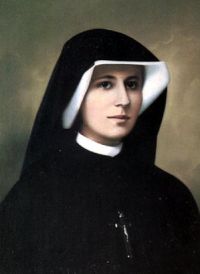I received the following email with some wonderful paragraphs from the
Diary of St. Faustina. She received visions of Our Lord, and through her, we have the Divine Mercy Chaplet and Divine Mercy Sunday.

[The next night] I saw my Guardian Angel, who ordered me to follow him. In a moment I was in a misty place full of fire in which there was a great crowd of suffering souls. They were praying fervently, but to no avail, for themselves; only we can come to their aid. The flames which were burning them did not touch me at all. My Guardian Angel did not leave me for an instant. I asked these souls what their greatest suffering was. They answered me in one voice that their greatest torment was longing for God. (20)
Jesus, when I cannot sing You the hymn of love, I admire the singing of the Seraphim, they who are so dearly loved by You. I desire to drown myself in You as they do. (195)
When I went to the garden one afternoon, my Guardian Angel said to me, "Pray for the dying." And so I began at once to pray the rosary with the gardeners for the dying. (314)
As the sisters were making their vows, I heard angels singing in various tones, "Holy, Holy, Holy," with chanting so delightful that no human tongue could ever match it. (1111)
[I] asked Him to arrange it that no evil person would dare come to the gate (of the convent). Then I heard these words: My daughter, the moment you went to the gate I set a Cherub over it to guard it. Be at peace. After returning from my conversation with the Lord [in the Chapel] I saw a little white cloud and, in it, a Cherub with his hands joined. His gaze was like lightning, and I understood how the fire of God's love burns in that look.. (1271)
As I was meditating on the sin of the Angels and their immediate punishment, I asked Jesus why the Angels had been punished as soon as they had sinned. I heard a voice: Because of their profound knowledge of God. No person on earth, even though a great saint, has such knowledge of God as an Angel has. (1332)
When I entered the chapel for a moment, the Lord said to me, My daughter, help Me to save a certain dying sinner. Say the chaplet that I have taught you for him. When I began to say the chaplet, I saw the man dying in the midst of terrible torment and struggle. His Guardian Angel was defending him, but he was, as it were, powerless against the enormity of the soul's
misery. A multitude of devils was waiting for the soul. But while I was saying the chaplet, I saw Jesus just as He is depicted in the image. The rays which issued from Jesus' Heart enveloped the sick man, and the powers of darkness fled in panic. The sick man peacefully breathed his last. When I came to myself, I understood how very important the chaplet was for the dying. It appeases the anger of God. (1565)
When during adoration, I repeated the prayer, "Holy God" several times, a vivid presence of God suddenly swept over me, and I was caught up in spirit before the majesty of God. I saw how the Angels and the Saints of the Lord give glory to God. The glory of God is so great that I dare not try to describe it, because I would not be able to do so, and souls might think that what I have written is all there is. Saint Paul, I understand now why you did not want to describe heaven, but only said that eye has not seen, nor ear heard, nor has it entered into the heart of man what God has prepared for those who love him...Now I have seen the way in which I adore
God; oh how miserable it is! And what a tiny drop it is in comparison to that perfect heavenly glory. (1604)
Once, when a certain doubt rose within me shortly before Holy Communion, the Seraph with the Lord Jesus stood before me again. I asked the Lord Jesus, and not receiving an answer, I said to the Seraph, "Could you perhaps hear my confession?" And he answered me, "No spirit in heaven has that power." And at that moment, the Sacred Host rested on my lips. (1677)
Read more from the Diary of St. Faustina.
 Double of the II Class (1954 Calendar): May 1
Double of the II Class (1954 Calendar): May 1












